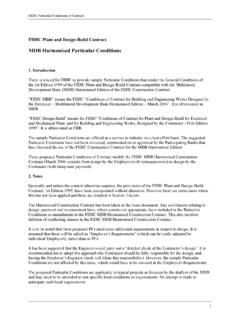Transcription of COP26 EXPLAINED
1 COP26 EXPLAINED Securing a brighter future for our children and future generations requires countries to take urgent action at home and abroad to turn the tide on climate change. It is with ambition, courage and collaboration as we approach the crucial COP26 summit in the UK that we can seize this moment together, so we can recover cleaner, rebuild greener and restore our planet. PRIME MINISTER OF THE UNITED KINGDOM BORIS JOHNSON 67 COP26 EXPLAINEDThe COVID-19 pandemic has brought devastation to millions around the world, disrupting many parts of the global economy. Governments, including our own, have stepped up to protect lives and livelihoods. But climate change has continued, and it ultimately threatens life on countries begin to recover from the Coronavirus pandemic, we must take the historic opportunity to tackle climate change at the same time to build back better, and greener.
2 We can deliver green recoveries across the globe that bring in good jobs, trillions in investment and ground-breaking new technology. And we must. To keep the temperature of the planet under control limiting its increase to degrees - the science dictates that by the second half of the century, we should be producing less carbon than we take out of the atmosphere. This is what reaching net zero journey is already underway. Despite the pandemic, the direction of travel is changing. Around 70% of the world economy is now covered by net zero targets, up from less than 30% when the UK took on the Presidency of COP26 . The world is moving towards a low-carbon future. Clean energy, like wind and solar, is now the cheapest source of electricity in most countries; many of the world s car makers are shifting to make only electric and hybrid models; countries around the world are starting important work to protect and restore nature; cities, states and regions across the world are also committing to reduce emissions to country, the UK, is leading the way over the last 30 years British governments have grown our economy by 78% while cutting emissions by 44%.
3 That shows green growth is real. In 2012, 40% of our electricity came from coal. That figure is now less than 2%. That shows that change is possible. The UK was the first country to pledge to reduce carbon emissions by 78% by 2035, we will completely phase out coal power by 2024 and will end the sale of new petrol and diesel vehicles by 2030. We are introducing legally binding targets to restore nature and radical reforms to agricultural subsidies. The Prime Minister has set out a Ten Point Plan for a green industrial revolution to help us reach our climate commitments whilst creating thousands of highly skilled jobs and already, many more Brits earn their living from clean green the world we are also seeing progress. Together with the United Nations, Italy, France and Chile we hosted the Climate Ambition Summit which brought together 75 leaders from around the world.
4 It was a major stride forward, with new commitments on climate announced by every leader who joined. It s an important indicator that we are all serious about getting carbon emissions down now. Even so, we re going to need much more. We cannot wake up in 2029 and decide to slash our emissions by 50% by 2030. That s why the next six months will see the UK push others not to flinch from the big policy decisions: ending coal power, phasing out polluting vehicles, making agriculture more sustainable, tackling deforestation and supporting developing countries with finance. Unfortunately reducing emissions is not enough. For many nations, the picture is far bleaker. I was born in India and for a time I served as the UK government s minister responsible for international aid I have real sympathy with less developed countries that feel it s for the developed industrial nations to help sort out a problem largely of their making.
5 Indeed, one of the reasons we are determined to hold COP26 in person is to ensure the voices of these countries are heard and acted those countries most vulnerable to the impacts of climate change - FOREWORDwho are already seeing their homes disappear under water and their crops decimated by drought - COP26 simply can t be another talking shop. In 2009, rich countries promised they would work towards raising $100bn each year by 2020 to help these countries tackle climate change. Donors need to demonstrate that the target will be met and surpassed. As COP President Designate, I am determined that we is no viable pathway to net zero emissions that does not involve protecting and restoring nature on an unprecedented scale. If we are serious about holding temperature rises to degrees and adapting to the impacts of climate change, we must change the way we look after our land and seas and how we grow our food.
6 This is also important if we want to protect and restore the world's biodiversity, upon which all life COP26 , we will work with partners to take forward action on protecting and restoring forests and critical ecosystems, and we will champion the transition towards sustainable, resilient and nature positive agriculture. COP26 needs to be decisive. Whether future generations look back at this time with admiration or despair, depends entirely on our ability to seize this moment. Let s seize it SHARMACOP PRESIDENT-DESIGNATEFOREWORD89 COP26 EXPLAINEDA round the world storms, floods and wildfires are intensifying. Air pollution sadly affects the health of tens of millions of people and unpredictable weather causes untold damage to homes and livelihoods too. But while the impacts of climate change are devastating, advances in tackling it are leading to cleaner air, creating good jobs, restoring nature and at the same time unleashing economic growth.
7 Despite the opportunities we are not acting fast enough. To avert this crisis, countries need to join forces November, the UK, together with our partner Italy, will host an event many believe to be the world s last best chance to get runaway climate change under control. For nearly three decades the UN has been bringing together almost every country on earth for global climate summits - called COPs - which stands for Conference of the Parties . 'In that time climate change has gone from being a fringe issue to a global priority. This year will be the 26th annual summit giving it the name COP26 . With the UK as President, COP26 takes place in the run up to COP26 the UK is working with every nation to reach agreement on how to tackle climate change. More than 190 world leaders are expected to arrive in Scotland.
8 Together with tens of thousands of negotiators, government representatives, businesses and citizens for twelve days of talks. Not only is it a huge task but it is also not just yet another international summit. Most experts believe COP26 has a particular urgency. INTRODUCTIONINTRODUCTIONTo understand why, it s necessary to look back to another COP. COP21 took place in Paris in 2015. For the first time ever, something momentous happened: every country agreed to work together to limit global warming to well below 2 degrees and aim for degrees, to adapt to the impacts of a changing climate and to make money available to deliver on these aims. The Paris Agreement was born. The commitment to aim for degrees is important because every fraction of a degree of warming results in the tragedy of many more lives lost and livelihoods the Paris Agreement, countries committed to bring forward national plans setting out how much they would reduce their emissions - known as Nationally Determined Contributions, or NDCs.
9 They agreed that every five years they would come back with an updated plan that would reflect their highest possible ambition at that time. The run up to this year s summit in Glasgow is the moment (delayed by a year due to the pandemic) when countries update their plans for reducing emissions. But, the commitments laid out in Paris did not come close to limiting global warming to degrees, and the window for achieving this is closing. The decade out to 2030 will be crucial. So as momentous as Paris was, countries must go much further to keep the hope of holding temperature rises to degrees alive. International climate summits are complex. Here in the UK COP26 team we want to make it as easy as possible for you to understand what COP26 is and what the UK team is working to achieve.
10 In this introduction you ll find the summary of our goals; explanations of the processes, a glossary for technical phrases and perhaps most importantly, ways for you to get involved. CLIMATE CHANGE IS THE GREATEST RISK FACING US EXPLAINEDUK LEADERSHIPThe UK has a lot to be proud of when it comes to acting on climate change. We have shown that climate action can go hand-in-hand with economic growth. Between 1990 and 2019, we achieved record clean growth. In that time, our economy grew by 78% and our emissions decreased by 44% over this time, the fastest decline in the G7. We have decarbonised our economy faster than any other country in the G20 since 2000 We were the first major economy to put into law that we will reach net zero carbon emissions by 2050 We are the largest producer of offshore wind energy in the world We will end direct government support for the fossil fuel energy sector overseas We are doubling our international climate finance to help developing nations with over the next five years up to 2025/2026 We have announced the end of the sale of new petrol and diesel cars in the UK by 2030.




